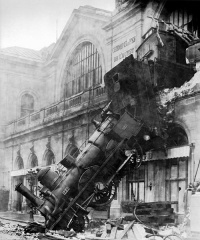Progress
From The Art and Popular Culture Encyclopedia
(Difference between revisions)
| Revision as of 13:14, 15 August 2019 Jahsonic (Talk | contribs) ← Previous diff |
Revision as of 13:14, 15 August 2019 Jahsonic (Talk | contribs) (Social progress moved to Progress) Next diff → |
Revision as of 13:14, 15 August 2019
|
"What we call "Progress" is the exchange of one nuisance for another nuisance" --Havelock Ellis |

Train wreck at Montparnasse (October 22, 1895) by Studio Lévy and Sons; Technology cannot exist without the potential for accidents. For example, the invention of the locomotive also entailed the invention of derailment and French philosopoher Paul Virilio sees the accident as a negative growth of social positivism and scientific progress.
|
Related e |
|
Featured: |
Progress may refer to:
- Progress (history), the idea that the world can become increasingly better in terms of science, technology, modernization, liberty, democracy, quality of life, etc.
- Social progress, the idea that societies can or do improve in terms of their social, political, and economic structures.
- Scientific progress, the idea that science increases its problem solving ability through the application of some scientific method.
- Philosophical progress, the idea that philosophy has solved or at least can solve some of the questions it studies.
- Idea of Progress, the theory that scientific progress drives social progress; that advances in technology, science, and social organization inevitably produce an improvement in the human condition.
- Progress trap, the condition societies find themselves in when human ingenuity, in pursuing progress, inadvertently introduces problems that it does not have the resources to solve, preventing further progress or inciting social collapse.
Etymology
From Latin pro- (“forth, before”) + gradi (“to walk, go”)
See also
Unless indicated otherwise, the text in this article is either based on Wikipedia article "Progress" or another language Wikipedia page thereof used under the terms of the GNU Free Documentation License; or on research by Jahsonic and friends. See Art and Popular Culture's copyright notice.
.jpg)

